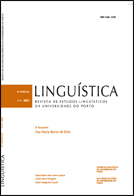The "língua desportuguesa". Proclisis in Angolan Portuguese and Mozambican Portuguese
Abstract
The expansion of proclisis in contexts that typically exclude it in European Portuguese has been described as a syntactic feature that characterizes Angolan Portuguese. This article studies the presence of this feature in the literary language, based on a corpus of texts by Angolan
and Mozambican authors, representing two generations: authors born in the colonial period (the Angolan Pepetela and the Mozambicans Mia Couto and Paulina Chiziane) and authors born after the independence of their countries (the Angolan Ondjaki and the Mozambican Lucílio Manjate). The study results show that proclisis has a stronger presence in the works of Angolan authors than Mozambican authors, suggesting that the shift towards the generalization of proclisis is more advanced, socially widespread and accepted in Angolan Portuguese than in Mozambican Portuguese, although it is visible in both. It is in non-finite domains that the contrast between the two African varieties is more evident. Not only is the frequency of proclisis to the infinitive higher in the Angolan Portuguese corpus, but only there is proclisis to the past participle attested. Comparing the two generations of writers, we see a significant rise of proclisis to the infinitive between Pepetela and Ondjaki and it is in Ondjaki’s works that proclisis to the past participle occurs. Regarding the Mozambican Portuguese corpus, however, there seems to be a regression in the advance of proclisis between Mia Couto and Manjate. A closer look at Rabhia, by Manjate (2017), suggests that young speakers with a high level of education may perceive the spread of proclisis as a socially marked feature.
References
Avelar, J. & Galves, C. (2014). O papel das línguas africanas na emergência da gramática do português brasileiro. Revista Linguística – ALFAL. 30(2): 241-288.
Browne, C. (2021). A colocação de pronomes clíticos em Niketche. Uma história de poligamia da autora Paulina Chiziane. Trabalho final do Seminário de Linguística Histórica. Faculdade de Letras da Universidade de Lisboa. Ms.
Chavagne, J.P. (2005). La langue portugaise d’Angola: étude des écarts par rapport à la norme européenne du portugais. Université Lumière Lyon. Tese de doutoramento.
Fernández-Rubiera, F. J. (2009). Clitics at the Edge: Clitic Placement in Western Iberian Languages. Georgetown University, Washinton, DC. Tese de doutoramento.
Fernandez-Rubiera, Francisco J. (2010). Forceo, Finitenesso, and the placement of clitics in Western Iberian. Estudos de Lingüística Galega. 2(1): 75-95.
Inverno, L. C. C. (2009a). Contact-induced restructuring of Portuguese morphosyntax in interior Angola. Evidence from Dundo (Lunda Norte). Faculdade de Letras da Universidade de Coimbra. Tese de doutoramento.
Inverno, L. C. C. (2009b). A transição de Angola para o português vernáculo: estudo morfossintáctico do sintagma nominal. In Ana Carvalho (Ed.). Português em contacto. Frankfurt A.M./Madrid: Iberoamericana/Vervuert, 87-106.
Gerards, D. P. (2018). The Harbinger of a New Standard? The Placement of Clitic Object Pronouns in Colloquial Angolan Portuguese. Acesso em 12.06.2021: https://pt.scribd.com/document/406120197/Gerards-Angolan-Portuguese. A publicar em Verónica Böhm,
Anja Hennemann & Benjamin Meisnitzer (Eds.). Sprachkontakt und Grammatikalisierung [provisionary title]. Heidelberg: Winter.
Gonçalves, P. (2000). Para uma aproximação Língua-Literatura em português de Angola e Moçambique. Via Atlântica. 4: 212-223. https://www.revistas.usp.br/viaatlantica/article/view/49614
Hagemeijer, T. (2016). O português em contacto em África. In: Ana Maria Martins & Ernestina Carrilho (Eds.). Manual de Linguística Portuguesa, Berlin/Boston: De Gruyter, 43-67.
Khan, S., Falconi, J. & Krakowska, K. (2016). Moçambique: novas gerações em diálogo. Cerrados – Revista do Programa de Pós-Graduação em Literatura. 41: 314-329.
Kayne, R. (1991). Romance clitics, Verb-movement, and PRO. Linguistic Inquiry. 22(4): 647-686.
Martins, Ana Maria. (1994a). Enclisis, VP-deletion and the nature of Sigma. Probus. 6(2-3): 173-205.
Martins, A. M. (1994b). Clíticos na História do Português. Faculdade de Letras da Universidade de Lisboa. Tese de doutoramento.
Martins, A. M. (2013). A posição dos pronomes pessoais clíticos. In: Eduardo Paiva Raposo, Maria Fernanda Bacelar, Maria Antónia Mota, Luísa Segura & Amália Mendes (Eds.). Gramática do Português. Lisboa: Fundação Calouste Gulbenkian, 2231-2302.
Martins, A. M. (2016). A colocação dos pronomes clíticos em sincronia e diacronia. In: Ana Maria Martins & Ernestina Carrilho (Eds.). Manual de Linguística Portuguesa. Berlin/Boston: De Gruyter, 401-430.
Martins, A. M. (2021). Microvariação na sintaxe dos clíticos: os dialetos portugueses dos Açores e Madeira. Estudos de Lingüística Galega 13: 67-105.
Mutali, H. (2019). A colocação dos pronomes clíticos no português angolano escrito. Faculdade de Letras da Universidade de Lisboa. Tese de Mestrado.
Quan, Y. (2021). A colocação dos pronomes clíticos no português escrito de Moçambique. final do Seminário de Linguística Histórica. Faculdade de Letras da Universidade de Lisboa. Ms.
Raposo, E. P. (2000). Clitic positions and verb movement. In: João Costa (Ed.). Portuguese syntax: New comparative studies. Oxford: Oxford University Press, 266-298.
Raposo, E. P.& Uriagereka, J. (2005). Clitic Placement in Western Iberian: A minimalist view. In: Guglielmo Cinque & Richard S. Kayne (Eds.). The Oxford Handbook of Comparative Syntax. Oxford: Oxford University Press, 639-697.
Santos, L. M. da S. (2018). A influência africana no português vernáculo brasileiro: reflexões sobre clíticos de objeto. Faculdade de Letras da Universidade de Lisboa. Tese de mestrado.
Soma Adriano, P. (2015). A crise normativa do português em Angola: cliticização e regência verbal – que atitude normativa para o professor e o revisor?. Luanda: Mayamba.
Stilz, M. (2021). A colocação dos pronomes clíticos no português escrito literário da variedade de Angola (Luanda) na obra de Ondjaki: AvóDezanove e o Segredo do Soviético. Trabalho final do Seminário de Linguística Histórica. Faculdade de Letras da Universidade
de Lisboa. Ms.
Undolo, M. Edu da S. (2014). Caracterização da Norma do Português em Angola. Universidade de Évora. Tese de doutoramento.
Uriagereka, J. (1995). Aspects of the syntax of clitic placement in western Romance. Linguistic Inquiry. 26(1): 79-123.
Downloads
Published
Issue
Section
License
Copyright (c) 2021 Linguística: Revista de Estudos Linguísticos da Universidade do Porto

This work is licensed under a Creative Commons Attribution-NonCommercial 4.0 International License.



